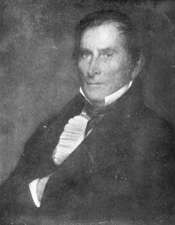George Poindexter
| George Poindexter | |
|---|---|
 | |
| 31st President pro tempore of the United States Senate | |
|
In office June 28, 1834 – November 30, 1834 | |
| Preceded by | Hugh Lawson White |
| Succeeded by | John Tyler |
| United States Senator from Mississippi | |
|
In office October 15, 1830 – March 3, 1835 | |
| Preceded by | Robert H. Adams |
| Succeeded by | Robert J. Walker |
| 2nd Governor of Mississippi | |
|
In office January 5, 1820 – January 7, 1822 | |
| Preceded by | David Holmes |
| Succeeded by | Walter Leake |
| Member of the U.S. House of Representatives from Mississippi's at-large congressional district | |
|
In office December 10, 1817 – March 3, 1819 | |
| Preceded by | William Lattimore (as Territorial Delegate) |
| Succeeded by | Christopher Rankin |
| Delegate to the U.S. House of Representatives from Mississippi Territory's at-large congressional district | |
|
In office March 4, 1807 – March 3, 1813 | |
| Preceded by | William Lattimore |
| Succeeded by | William Lattimore |
| Personal details | |
| Born |
1779 Louisa County, Virginia |
| Died |
September 5, 1853 (aged 73–74) Jackson, Mississippi |
| Political party |
Democratic-Republican Democratic |
| Spouse(s) |
Lydia Carter Agatha Chinn |
| Profession | Politician, Lawyer, Judge |
| Religion | Baptist |
George Poindexter (1779 – September 5, 1853) was an American politician, lawyer and judge from Mississippi. Born in Virginia, he moved to the Mississippi Territory in 1802. He served as United States Representative from the newly admitted state, was elected as Governor (1820-1822), and served as a United States Senator.
Background
Poindexter was born in Louisa County, Virginia in the Piedmont area. He was of French Huguenot and English ancestry.[1] Orphaned early in life, Poindexter had an education that was sporadic even for those times.[1] He may have been the uncle of Ohio abolitionist preacher James Preston Poindexter, whose father was Joseph Poindexter, a journalist at the Richmond Enquirer.[2]
He studied law and was admitted to the bar in 1800, commencing practice in Milton, Virginia (today West Virginia).
Mississippi

After moving to the Mississippi Territory in 1802, Poindexter set up his law practice in Natchez. He soon became a leader in the Democratic-Republican Party and was appointed Attorney General of the Territory. Poindexter was elected as a member of the Territorial House of Representatives in 1804.
Poindexter's outspoken opposition to the Federalist Party resulted in a duel challenge from wealthy merchant and planter Abijah Hunt. Poindexter accepted the challenge, killing Hunt in the duel. There was considerable controversy, with unsubstantiated claims made that Poindexter had fired at Hunt prematurely.[1] Despite the controversy, Poindexter entered politics successfully.
When former U.S. Vice President Aaron Burr was arrested in 1807 for the alleged Burr conspiracy, Poindexter conducted the prosecution until Burr's escape from custody.
Poindexter was elected as a delegate to the United States House of Representatives from the Mississippi Territory; he served in the 10th, 11th and 12th Congresses (1807 to 1813).
Judgeship and the House of Representatives
He was appointed as federal Judge for the Mississippi Territory, serving from 1813 to 1817.[1] Poindexter also served as a volunteer aide to William Carroll at the decisive 1814 Battle of New Orleans during the War of 1812.
Poindexter was chairman of the committee that was appointed to draft a constitution for the new state of Mississippi. After its admission in 1817, he was elected to be the state's first representative in Congress.[1] He served in the 15th Congress from 1817 to 1819, when he chaired the Committee on Public Lands.
After that, he was an unsuccessful candidate for the U.S. House of Representatives in 1820 to the 17th Congress and in 1822 to the 18th Congress.
Governor of Mississippi
In 1819 Poindexter was elected the second Governor of Mississippi by a large margin, winning more than 60% of the vote. He served from 1820 to 1822. During his time in office he oversaw a reorganization of the militia, the state created its first free public schools, state courts were reorganized, and Jackson was selected as the site for the state capital.
United States Senate
Poindexter was appointed to the United States Senate in 1830 to fill the vacancy caused by the death of Robert H. Adams, and served from 1830 to 1835. Soon after his appointment, he learned of the financial distress of Martha Jefferson Randolph, whose father Thomas Jefferson, the late president, had left an estate heavily encumbered by debt. Poindexter introduced a bill to grant Randolph 50,000 acres in Virginia, with the idea she could sell the land to raise money to live on. The bill failed to pass the Senate, and was rejected by the two Virginia senators in 1831.[3]
Poindexter served as chairman of the Committee on Private Land Claims in 22nd Congress from 1831 to 1833, of the Committee on Public Lands in the 23rd Congress from 1833 to 1835 and was President pro tempore of the Senate from June to November 1834.
Poindexter's tenure as chairman of the Committee on Private Land Claims had been considered moderately controversial at the time, as he had espoused some views that could be considered Socialist, regarding government repossession of land. Poindexter was thought to have made these claims to support President Andrew Jackson's fight with the Second Bank of the United States. He was a supporter of President Jackson, and had defended him against calls for censure stemming from the Arbuthnot and Ambrister incident, but had slowly become less happy with the President's policies.[1]
In 1834 Poindexter had his home in Washington, D.C. painted by Richard Lawrence. A deranged man, Lawrence came to believe that he was the ruler of England and the United States, and that Jackson was a usurper. In January 1835 Lawrence shot at Jackson with two pistols while the President was attending a memorial service for a Congressman at the House of Representatives. It was the first attempt to assassinate a President. Jackson accused various political enemies as being behind Lawrence. Among them was Poindexter, who denied any connection except for having his house painted. Poindexter also took issue with Vice President Martin Van Buren's support of Jackson during the debate over the Bank, and made explicit threats that caused Van Buren to carry pistols for self-defense when presiding over the Senate. The accusations about Lawrence followed Poindexter back to Mississippi, and he was unsuccessful in running for a second term.
He became embittered by these political problems in Mississippi due to his opposition to Jackson.[1] He also had domestic troubles.[1] He was said to have a serious liaison with a slave woman.
When several years before, Representative Richard M. Johnson of Kentucky was criticized for his common-law marriage with his slave Julia Chinn, he said, "Unlike Jefferson, Clay, Poindexter and others, I married my wife under the eyes of God, and apparently He has found no objections."[4]
Historian Burke has written,
During slavery times, there was no particular stigma attached to the fact that many southern plantation owners, along with their white overseers, often fathered mulatto children born of black slave women. As long as the white father denied the facts, the customs that created miscegenation were usually overlooked by Southern society.[4]
Johnson violated the norms by acknowledging Chinn as his wife and their daughters as his, plus trying to introduce his daughters to "polite society".[4]
Retirement from politics
In 1835, Poindexter moved to Kentucky, where he continued practicing law in Lexington. He later moved back to Jackson, Mississippi and continued his law practice until his death there on September 5, 1853. He was interred in Greenwood Cemetery in Jackson.
Family
In 1804 Poindexter married Lydia Carter (1789-1824), the daughter of a prominent Natchez businessman and plantation owner. They had two sons, George Littleton and Albert Gallatin. They divorced after Poindexter publicly accused his wife of infidelity and claimed that their second child, whom he disavowed, was the product of an extramarital affair between his wife and their neighbor. In 1820 Lydia Carter Poindexter married Reverend Lewis Williams and moved to Brimfield, Massachusetts.[5]
In 1816 Poindexter married Agatha Ball Chinn (1794-1822). They had one son who died of yellow fever as a child while Poindexter was Governor, and Agatha Poindexter died soon afterwards.
Notes
- 1 2 3 4 5 6 7 8
 Wilson, James Grant; Fiske, John, eds. (1900). "Poindexter, George". Appletons' Cyclopædia of American Biography. New York: D. Appleton.
Wilson, James Grant; Fiske, John, eds. (1900). "Poindexter, George". Appletons' Cyclopædia of American Biography. New York: D. Appleton. - ↑ Simmons, Martha. Preaching with Sacred Fire: An Anthology of African American Sermons, 1750 to the Present. WW Norton & Company, 2010. p322-323
- ↑ Marc Leepson, Chap. One, "Stealing Monticello", Saving Monticello: The Levy Family's Epic Quest to Rescue the House that Jefferson Built, University of Virginia, 2001, accessed November 12, 2013
- 1 2 3 Henry Robert Burke. Richard Mentor Johnson: "Window to the Past", Lest We Forget Communications. Retrieved on January 3, 2008.
- ↑ Lydia Carter Williams at Find a Grave
References
- United States Congress. "George Poindexter (id: P000402)". Biographical Directory of the United States Congress.
External links
| United States House of Representatives | ||
|---|---|---|
| Preceded by William Lattimore |
Delegate to the U.S. House of Representatives from Mississippi's at-large congressional district March 4, 1807 – March 3, 1813 |
Succeeded by William Lattimore |
| Preceded by (none) |
Member of the U.S. House of Representatives from Mississippi's at-large congressional district December 10, 1817 – March 3, 1819 |
Succeeded by Christopher Rankin |
| Political offices | ||
| Preceded by David Holmes |
Governor of Mississippi January 5, 1820 – January 7, 1822 |
Succeeded by Walter Leake |
| Preceded by Hugh Lawson White |
President pro tempore of the United States Senate June 28, 1834 – November 30, 1834 |
Succeeded by John Tyler |
| United States Senate | ||
| Preceded by Robert H. Adams |
U.S. Senator (Class 2) from Mississippi October 15, 1830 – March 3, 1835 Served alongside: Powhatan Ellis and John Black |
Succeeded by Robert J. Walker |
.svg.png)


